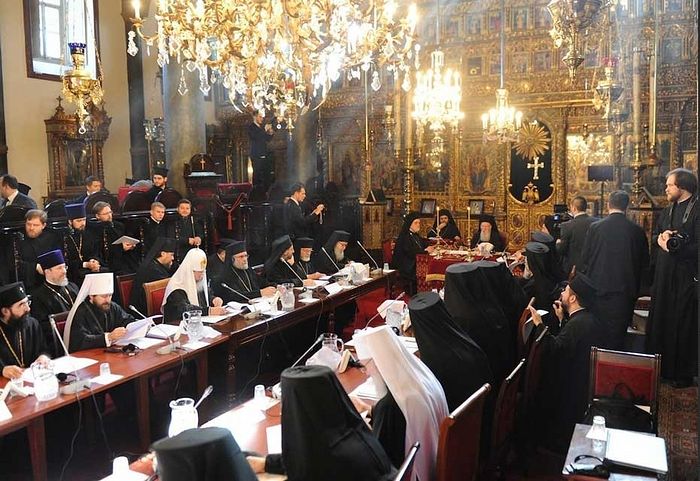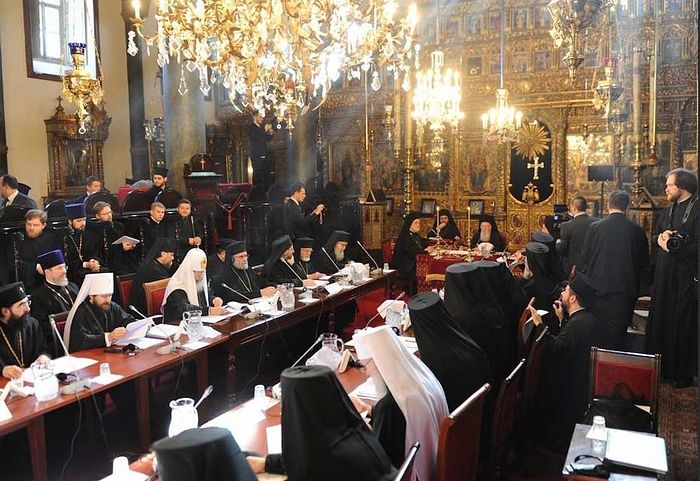
The Holy & Great Council: Will It Split the Orthodox World or Unite ?

Tamar Lomidze- OCP News Service- 10/6/16
The ‘Pan-Orthodox Council’ is scheduled to start on the 19th of June on Crete. From the very beginning, this initiative provoked stormy discussion among Orthodox clerics and laics on the necessity of this event. Today these contradictions threaten to disrupt the holding of the Pan-Orthodox Council.
Antiochian, Bulgarian, Georgian, Russian and Serbian Orthodox Churches have serious concerns about some of the documents up for discussion. Some of these Churches are upset over the Council’s agenda and procedures as well. Besides, Patriarchate of Antioch expressed its discontent over the Ecumenical Patriarchate’s decision to postpone settlement of the Antioch-Jerusalem jurisdictional dispute involving Qatar.
Even among those Churches who officially support the idea to conduct the Holy and Great Council as planned there is a lot of clergies who oppose it. For example, Knot of Holy Mount Athos demanded inclusion in the documents of the Council’s position that non-Orthodox denominations should not be addressed as Churches, and all forms of joint prayers and liturgical action with them should be discontinued. Moreover, at least three Greek Metropolitans refused to represent their Church at the (used to be referred as historical) event.
Firstly, the Council’s draft documents have been in preparation for decades. It’s quite strange that Synods of Local Churches are supposed to vote for them only six months after they were published. And until there is no consolidated and unanimous attitude toward these documents inside the Local Churches, forcibly imposed Pan-Orthodox decision would only split them.
Secondly, as Metropolitan Gabriel of Lovech explained to the site Dobrotolyubie (Philokalia), current disagreements couldn’t have been settled properly during pre-conciliar conferences because when someone had wanted to introduce changes, those who had led the meetings of the commission had been saying: “We don’t have regulations for introducing these changes, as we were told at the Synaxis of the Patriarchs, we are to make only small changes.”
Moreover, Bulgarian Metropolitan claims that according to the Conciliar regulations (which were voted upon by the Patriarchs but not the Council) no amendments would be accepted at the Council as well. “That’s what the members of the commission didn’t know. They thought: “Okay, we’ll sign for the sake of this or that, so that none of the meetings of the commission will fail, because after all there will be the Council”—but it turns out that what was accepted by the commission is, in essence, impossible to change at the Council,” – His Eminence Gabriel says.
That’s why he says: “they invited us to a Council where everything has already been predetermined”. And I suppose that’s why Greek Metropolitans echo him saying “We are not stooges”.
Thirdly, in order to maintain the principle of Conciliarity, the Moscow Patriarchate proposed to “hold a conference before the Council to tackle all the issues due to which Churches are now refusing to participate one after another.” The head of the Synodal Department for External Church Relations Metropolitan Hilarion said in an interview with Russia-24 channel that if these issues weren’t resolved, it’s probably would be better to postpone the Council. “Decisions at the Council should be made by a unanimous consensus. What does that mean for us? It means not simply the agreement of everyone present in the hall on one statement or another, one document or another. For us it means that all Churches should express agreement with it,” – the hierarch said.
Meanwhile, the Patriarchate of Constantinople which is responsible for coordinating preparations for the Council on June 6 declined the proposal for the discussion of problems obstructing the convocation of the Council. As a result of His All-Holiness Bartholomew’s unwillingness to hear concerns of other thirteen Authocephalous Churches, by now three of them – the Bulgarian Orthodox Church, the Patriarchate of Antioch and the Patriarchate of Serbia, – have officially refused to take part in the Council until the issues are solved.
Thus, at present, the Holy and Great Council can’t be referred as Pan-Orthodox at all. And what the Rev. John Chryssavgis, an archdeacon and theological adviser to Patriarch Bartholomew of Constantinople, states about unity as an objective has no ground in real Conciliar regulations. Moreover, there is only God above the Synods and it’s just broad consensus and true spirit of love among participants that can prove the rectitude of Council’s decisions.
I hope and pray for such unanimity to be reached in the whole Orthodox world before the Holy and Great Council – even if the meeting will have to be postponed for this sake. Otherwise, the words Holy and Great will simply lose their sense….
Source:
Independent

Otherwise, the words Holy and Great will simply lose their sense…
[…] By Orthodoxy Cognate PAGE […]
[…] Tamar Lomidze says that, at present, the Pan-Orthodox Council “can’t be referred as Pan-Orthodox at all”. […]
[…] Tamar Lomidze says that, at present, the Pan-Orthodox Council “can’t be referred as Pan-Orthodox at all”. […]
Source: Independent”
What does that mean?
Anyone can report that they’re independent.
[…] Source link […]
Could all this be translated into English, please?
The author seems to be of a Georgian descent… And Georgian is a very complex language… Let’s forgive her!
Thanks to the links, the main idea is clear.
In my opinion, it’s really reasonable for the Ecumenical Patriarchate to postpone the event to the later date. Even if something is discussed at the Council in Crete, it would be virtually impossible to reach consensus by the June 27. There are so many divisions and unsolved issues! Let’s remember, how long the first seven ecumenical councils took!
But now one can communicate with others via Internet and a lot of work may be done before the main meeting. So, the more preparation done in advance – the more fruitful the Council will be!
if each patriarchate is rightfully independent, why would unity among them even be a useful topic. they profess by definition that division is at the heart of the gospel they preach.
even to allow the subject of unity to be broached is to deny their historic theology of division.